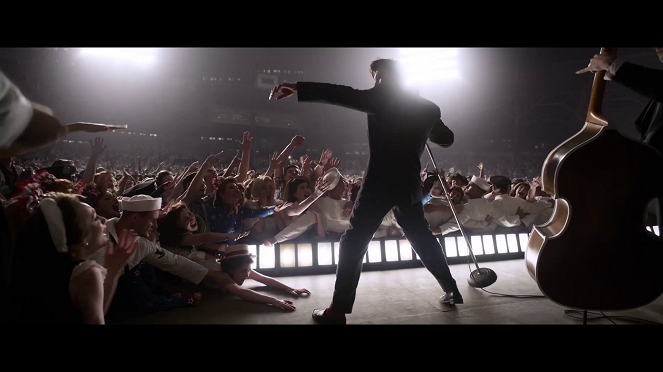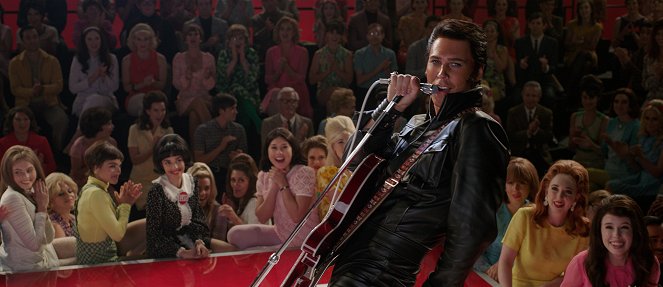Directed by:
Baz LuhrmannCinematography:
Mandy WalkerComposer:
Elliott WheelerCast:
Austin Butler, Tom Hanks, Olivia DeJonge, Richard Roxburgh, Helen Thomson, Dacre Montgomery, Luke Bracey, Kelvin Harrison Jr., Kodi Smit-McPhee, David Wenham (more)VOD (3)
Plots(1)
Baz Luhrmann’s Elvis explores the life and music of Elvis Presley, seen through the prism of his complicated relationship with his enigmatic manager, Colonel Tom Parker. The story delves into the complex dynamic between Presley and Parker spanning over 20 years, from Presley’s rise to fame to his unprecedented stardom, against the backdrop of the evolving cultural landscape and loss of innocence in America. Central to that journey is one of the most significant and influential people in Elvis’s life, Priscilla Presley. (Warner Bros. US)
(more)Videos (2)
Reviews (13)
It was agony to spend nine years waiting for Baz Luhrmann's next feature film, but at least in terms of the visuals, the editing, and the overall use of the author's characteristic mannerisms, Elvis didn't disappoint, quite the contrary. Everything shines, pulsates, and moves from side to side, from window to window, or over the rooftops exactly as the fans would have hoped. The problematic yet daring creative twist is the narrator. To distance oneself from the idolized icon and let someone speak who, even with the greatest objectivity, is the antagonist, could have resulted in an absolute screenwriting disaster. Instead, Elvis is more alive than other biopics, but also not always comfortable for the audience and sometimes even venomous. In short, it's as if Fletcher were telling us about Australia, or even if the Duke himself was guiding us with his voice after Moulin Rouge! – a completely different kind of emotional experience. I understand everyone for whom this change didn't land right, but I also understand everyone who felt that the creators were forcing them to start hating Tom Hanks. I stayed close to the enthusiastic fever of all the camera and sound tricks, but slightly bitter that all of Baz's films in the last thirty years have resonated with me a bit better.
()
When Baz Luhrmann chose Elvis Presley as his new subject, it was clear that once again it would be a film that you had to see more than once. That’s exactly what happened. The result is brilliant. A great homage to classic great biopics with a fatal antagonist (in the style of Amadeus) and the splendor of a dying carnival world (American Horror Story: Freak Show or Nightmare Alley). Where are my DVDs of G. I. Blues, Blue Hawaii and Girls! Girls! Girls!? ;)
()
A lavish and ornate ride. The film doesn't stop for a moment, it's bursting with ideas and, unlike The Great Gatsby, it's fully deserving of them all, because you expect exactly what Elvis gives you from a film that pays homage to the King. How timeless his music was is evidenced by probably the best original soundtrack I've ever heard, which puts Elvis's hits into the hands and throats of contemporary musicians who do whatever they want with them, and yet they're still absolutely great. Great joy... And as for Austin Butler, also a big surprise – I didn’t like him much in the trailers, but in the film he just needed a few minutes and he had me in the palm of his hand. And there were tears at the end, I just couldn't help it. Tom Hanks was also great, he shows what a versatile actor he is when given the chance. Great job. I have the urge to go to the cinema again like I did for Bohemian Rhapsody or the unjustly neglected Rocketman, although those films couldn't be more different.
()
Austin Butler looks nothing like Elvis, he doesn't have his unique charisma (no one does), but he’s a total magnet for women with his knockout looks, so he's a clear casting hit. Unlike the overrated Bohemian Rhapsody, which was held under the authoritative thumb of Brian May and where Rami Malek only played Mercury, Butler became Elvis for two and a half hours with his movements, his sexy deep voice, and the sparkle in his eye, which Malek didn't have. The first hour is a roller coaster ride, the timing of the scenes, the blending with the comic book panels, the craziness of the female fans, the riveting live performance where Elvis was arrested, the editing is fantastic. But there’s one big BUT. From the moment the Beatlemania fatally interferes with Presley's career, the film loses traction and, rather than focusing on the first ten years or so of his career, when he influenced rock 'n' roll like no one else, the story focuses on the last phase of his work and life, which is no longer so crucial and interesting. I would cut short everything that revolved around his career winding down at the International Hotel in Las Vegas. PS: Tom Hanks is perfect as the backstabbing manager. This is where I'm sure at least an Oscar nomination will clink.
()
In the first half of Elvis, emphasis is placed on, among other things, the rebellious Elvis’s clashes with the censorship board, which considers his gyrations to be obscene, whereas the second half focuses primarily on Presley’s conflicts with the people close to him, whose expectations he either refuses to meet on principle or, to his own disappointment, he is unable to meet. A running theme throughout the film consists in Elvis’s steadfast effort to preserve his own exceptional personal and musical identity, which is the only key to the artist’s success and immortality. The charismatic Austin Butler, a gifted singer in his own right, is absolutely excellent in the title role. He is not only able to captivate without batting an eye during the fantastically filmed musical numbers, but he also manages to naturally and sensitively convey a broad range of emotions even in the quieter moments. Most of the supporting and peripheral roles are also well cast according to type. Of course, the great Tom Hanks has the most space in the film as Presley’s manager and as the narrator, who in his commentary repeatedly tries to convince us that he always meant well by his charge, but his actions, captured by his image, tell us the opposite is true. His perspective as an unreliable narrator naturally complements Elvis’s perspective and the film is based substantially on the transformations of their friendship and family/business relationship. The story adheres to a precisely rhythmized structure, in which Elvis’s performances always comprise the climax of individual segments and time periods. Director Baz Luhrmann does his best work since Moulin Rouge and he also excels as a phenomenal audio-visual storyteller and master of the edited montage, who needs only a few two-second shots and appropriate musical backing to instantly capture the right mood of the given moment, setting and circumstance with unparalleled brilliance. In the genre of biopics about music legends, Elvis is a gem that presents its title character in many different situations and styles, engages your interest regardless of whether or not you know his life story and songs, and simply cannot conceal the identity of its director thanks to Luhrmann’s many recognizable trademarks and filmmaking techniques. From the opening scene onwards, it is an audio-visually riveting and engaging film that demands to be seen on the big screen.
()



Ads